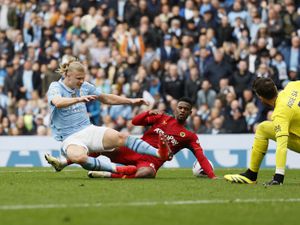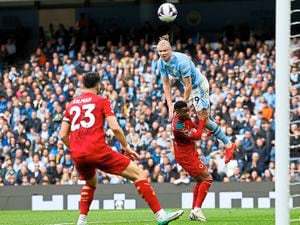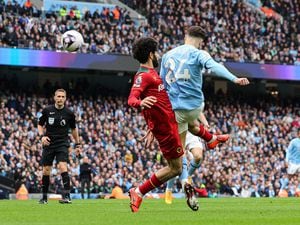Paul Cook is feeding his passion
Paul Cook loves football.
That might seem like ‘stating the bleedin’ obvious’ when it comes to any player or manager, particularly one who made 731 appearances in a career spanning 22 years and has already chalked up almost the same amount in the dugout.
But Paul Cook really loves football. You can just tell.
Whether it was with the way he played the game, usually with a smile on his face and trying the impossible with that wand of a left foot, with the excitable way he has always spoken about the game – in interviews as both player and manager – or his infectious enthusiasm as a boss kicking every ball on the sidelines.
Cook is certainly one of the game’s personalities.
Only a month before losing his job at Ipswich, after a 4-1 win at Wycombe Cook was coming off the pitch past their ‘Tunnel Club’ equivalent and, knowing there were some travelling fans in there, banged the window and held his arms aloft. Even though it was one way glass.
Larger than life as both player and manager, at the hub of the dressing room as player and manager, and one who has enjoyed plenty of success as player and manager.
That is Cook. And he loves football.
“It’s brilliant, isn’t it?” he says in a phone call during which he speaks as quickly and emotively as one of those raking exocet through balls that used to land on the toes of Steve Bull.
“I remember as a young lad growing up, the biggest quality we all had, especially in the Liverpool area, was our love of playing football.
“This was all before the days of academies, and when I look at some of the kids coming through that system now, I do wonder if they love the game as much as we did.
“If you have that love of football it never leaves you, it never goes away.”
We cut to the chase.
That left foot. Regarded by many Wolves fans as among the best they have ever seen across generations of following the club. Inspiring the ‘Paul Cook’s Cultured Left Foot’ moniker of one of the regular contributors to the A Load of Bull fanzine.
“Could open a tin of beans with that left foot,” says one fan.
“Stick it in the Louvre,” adds another.
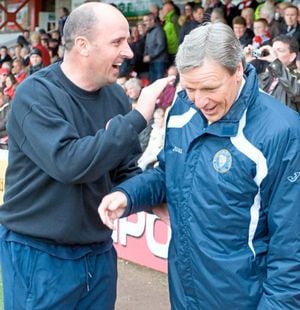
The through balls to Bull and Andy Mutch, unerring accuracy with either instep or the outside of the boot, scoring from a corner and then trying to follow up every single flag kick afterwards.
Now and again there were mistakes – trying regularly to thread passes through the eye of a needle makes those impossible to avoid – and the right foot wasn’t utilised all that often. But the left? A work of art.
Was it natural ability? Extra training? Constant use?
“I’m not going to be clever about it,” Cook replies.
“It was just practice and hard work.
“Without a shadow of a doubt I spent a lot of time as a lad on my technique and my ability, taking corners and free kicks, playing head tennis.
“I always take it as what you practice during the week tells you how you will perform on a Saturday.
“I loved playing football, I loved training and I love being in and around football clubs because dressing rooms are the best place to be.”
Cook’s love of football means that he hopes his current inactivity – he was sacked by Ipswich in December after just nine months at the helm – is fleeting.
He has been getting more use out of his Liverpool season ticket – a proper fan he was at the 1974 FA Cup Final and 1984 and 2005 European Cup Finals amongst others - and most recently travelled to Selhurst Park for the Reds’ most recent Premier League fixture at Crystal Palace.
As already mentioned, it was around Liverpool that Cook’s footballing dreams were launched with Marine, not far from his birthplace in Kirkby.
A winger in those early years, he was snapped up by Wigan in the Third Division, chalking up a century of appearances before landing a move to Wolves’ weekend opponents Norwich, in the top flight.
The Canaries were flying high, finishing fourth in the 1988/89 campaign during which Wolves were achieving a second successive lower league promotion, but Cook’s impact was limited to featuring six times in the first team.
“Wigan was fantastic for me and so was the move to Norwich but at the time their two central midfielders were Andy Townsend and Mike Phelan,” Cook recalls.
“One of those was a regular with the Republic of Ireland and the other played for England.
“I was 20-years-old, I was impatient, and I wanted to play, and that was the crux of it.

“Norwich actually offered me a new contract but the opportunity to join Graham Turner at Wolves, to go right into the team with the challenge of getting into the top division was there for all to see.”
Cook moved to Molineux for £250,000, enjoying a spell of five years during which he chalked up 214 appearances, scoring 21 goals.
As experienced by so many plying their trade at Wolves during such a lengthy spell in the second tier, there were many hits, misses and maybes over that half a decade.
But it was certainly a time – amid all the ups and downs - when Cook was able to make his name as a silky and skilful central midfielder, and for the most part a presence who was appreciated by the fanbase.
His debut on a stormy night against Leicester at Filbert Street probably set the tone for the mixed emotions of the years to follow.
A frenzied atmosphere on a frosty midweek November night in front of a capacity crowd, World Cup-bound Bull got sent off in front of England boss Bobby Robson for taking a swing at Steve Walsh, and the game somehow finished 0-0.
“What a night that was,” Cook reminisces.
“A great game, an electric atmosphere, and between 4,000 and 5,000 Wolves fans there giving it their all.
“That has always been a big thing about Wolves fans for me – the way they travel in such big numbers.
“And when you did manage to get a result for them, what a reception they would give you, it was amazing.”
Off and running at Leicester, Cook marked his Molineux bow days later, a 1-0 win over West Ham, with an assist for the only goal of the game for Bull, whose suspension was yet to kick in.
The first of many ‘Cook and Bull’ stories which would become a familiar refrain.
There were several other highlights particularly in that first half season, from the 4-1 New Year’s Day win at Newcastle, in which his pass set up the first of Bull’s four, to scoring in a 2-1 victory against West Bromwich Albion.
In what was very much an era of mid-table mediocrity at Molineux, Cook’s final season probably started as positively as any other with high-profile new signings and a win against
Bristol City but injuries soon hit and the campaign continued into another in which Wolves failed to reach the Premier League.
Sadly, that was the familiar tale for so many of those players of the 1990s. So much promise, so much potential but, agonisingly, no promotion.
“I have had promotions as a player and a manager and they are absolutely amazing and stay with you forever,” says Cook.
“And that remains one of my biggest disappointments in football, not to be part of a Wolves team that got promoted.
“Why didn’t we do it? It is difficult to say.

“I never want to be over-critical, but I just wonder if part of the problem with making that last step was that Graham had been so successful in bringing the team up from the fourth to the second divisions.
“Everyone knows that there is a difference between the leagues, especially in reaching the top, and I just wonder – and this is the best criticism you can ever level at a manager – if he was too loyal to those players.
“A lot of those players had delivered for Graham and the club, there had been that brilliant day at Wembley beating Burnley – and when you achieve success like that you want it to last forever.
“Having become a manager, I know how difficult it can be, but perhaps if there had been the opportunity to bring in a few players from a higher level a bit quicker things might have been different.
“It was after Graham left that the club went into a different era, the signings changed, and international footballers started coming to Molineux.
“But what I would say, for Graham and all those players connected with that time and those back-to-back promotions, they should be very, very proud of what they achieved for the football club.”
That success was in no small part due to the unshakeable team spirit nurtured inside the dressing room, an ethos which Cook embraced and added to.
The squad worked hard, and played hard, and the ‘Tuesday Club’ – “probably the best club of all”, laughs Cook – has gone down in Wolves folklore.
As has been regularly revealed, that was the code for, in the absence of a midweek fixture, Turner running the squad ragged in training on a Tuesday which paved the way for an afternoon of how shall we put it, ‘heavy socialising’, ahead of a day off on a Wednesday.
“Those Tuesday sessions were pretty famous as Graham would run us ever so hard in the morning, and we would run it out of ourselves in the afternoon,” Cook quips.
“When I think about it now, we just knew no different at the time.
“As a manager, I can look back and see the difference between having a good time and being successful, but football was very different in those days.
“Wolves was a very different club too – I remember Dot (Wooldridge) who did so much around the place, the secretary Keith Pearson, Mel (Bird) in the ticket office – the club was probably run by four or five people back in those days.
“Whatever they did it was certainly successful over those two promotions and maybe my time was just a bit of a transitional period before taking that next step.
“They were great times though, with great lads, and we all did our absolute best but just couldn’t get the club where we wanted it to be.”
Might Cook and Wolves have made it without the ‘Tuesday Club’ and the lively social life away from the football?
It is doubtful.
After all, the midweek and post-match ‘refuelling’ habits of the time were certainly not confined only to Wolves, and the team spirit which developed as a result made a huge contribution to the success of that squad.
Cook too was supremely fit, remembered infact as one of the fittest in the group – “you try telling that to my kids though, they don’t believe me!”
It is generally futile to compare and contrast footballing eras, but that left foot and Cook’s phenomenal passing range would surely have lent itself to one of the three-pronged midfields of the current climate.
And of course, he did grasp the opportunity to grace the Premier League after leaving Wolves by making the short trip across the West Midlands – one which Bull famously rejected shortly afterwards – to Coventry City.
Ideally Cook would also have stayed put – he had relished playing in a Wolves midfield alongside the likes of Keith Downing, Nigel Vaughan, Tom Bennett and Paul Birch but it was time to change and Graham Taylor was aiming to bring about a new dawn.
“The whole club was changing, training methods, everything about it, and I just felt my days were numbered,” Cook admits.
“Graham Taylor was different to Graham Turner but that is what we all are as managers, we are all different types.
“There were no problems between us in any shape or form and Graham was a really good man who loved his football but I was still sad to leave, still regretting not getting that promotion.”
Cook achieved his personal promotion however, and proved himself in the top flight making 34 Premier League appearances and scoring three goals for the Sky Blues, as well as featuring in a 3-2 win against Liverpool at his beloved Anfield.
His playing career included further spells with Tranmere, Stockport, Burnley – winning promotion from the third tier in 1999/00 – and then Accrington Stanley, helping them back into the Football League via the Conference title in 2005/06.
By now though he was already planning his next step, operating as player coach and tapping into the knowledge of Accrington Stanley’s legendary boss John Coleman, advice and guidance for which he will be forever grateful.
And management, for the best part of the last 16 years, has been Cook’s much-cherished vocation, in a variety of different postings.
It has also brought pretty much unparalleled success, with the exception of his first role, a difficult test in the Conference with Southport, and his most recent, that all-too brief tenure with Ipswich.
In between he has never been afraid to take on big decisions and big challenges – there was no managerial silver spoon here – and he responded to the Southport setback by heading over to the League of Ireland and winning two FAI Cups and a League Cup with Sligo Rovers, taking them into Europe.
A spell back with Accrington then preceded successes with Chesterfield (League Two title and League One play-off), Portsmouth (League Two title) and Wigan (League One title and several FA Cup giantkillings including against Pep Guardiola and Manchester City).
His win percentages were around or above the 45% mark at most, showing that Cook has a depth to his managerial talents beyond purely that of a jovial motivator.
Those who have played for him speak of an excellent man manager who is extremely well organised, as well as the potential to bring out a spot of the hairdryer treatment when the occasion demands it.
So, what does a Paul Cook team look like? What underpins the considerable success he has enjoyed so far, including three promotions within five years?
“For me, the biggest compliment you want someone to say after they have played against you is how hard your team works,” he replies.
“Talent without workrate is nothing, and as a manager I believe the three biggest things in football are culture, habits and trust.
“The manager creates the culture, he sets the habits and the trust develops.
“When you have those three at a club then you are well on your way to smashing it.
“Sometimes it takes time to create a culture, time to ingrain habits and that trust can only be developed over a period of time.
“I love trying to educate players, the coaching side, trying to make them better, and I love the dressing room and treating men like men and having that respect both ways.
“And going back to hard work, I think maybe the biggest thing supporters get disappointed at in the modern game is if they see what they think is a lack of workrate or honesty from their players.
“What you are always looking for as a team and as a manager at the end of the game is for the supporters to clap you off the pitch.
“As every manager knows, and I’m a football fan as well, a team doesn’t have to win a game of football to be clapped off the pitch.
“But it certainly has to show the right characteristics in the game to make sure the supporters can at least appreciate it, whatever the result.”
What permeates this entire interview is not just that Cook loves football but that he is also extremely keen and driven to get back in.
The rare failure at Portman Road has been a chastening experience, not least as he spent only nine months in the hotseat having followed in some other ex-Wolves footsteps such as Mick McCarthy and Paul Lambert in recent history.
Admittedly Ipswich were outside the play-off places in a division they feel they really need to be getting promoted from, but that followed the most considerable of summer upheavals with a squad’s worth of players departing and 19 new signings coming in.
Needless to say, Cook feels he deserved more time for everything to gel, but he is now focused on channelling that disappointment into motivation for what will hopefully be his next chapter.
“Listen, Ipswich is an absolutely fantastic football club with a supporter base which is passionate, which craves success and supports the team in their thousands,” he says.
“I really think they will go on to become a very successful club and I hope that they do.
“Of course, I was disappointed to be sacked there and after just 20 games of the season which is something I don’t agree with at all.
“And that’s nothing to do with me personally because it happened to me, but just generally in terms of getting rid of a manager so quickly.
“If that had happened at other clubs in the past then the likes of Sir Alex Ferguson wouldn’t have had the record he had with Manchester United, or Howard Kendall with Everton.
“There is a long list of managers who have been given time especially when clubs have been going through change and have gone on to be successful.
“But I feel my management career has been a strong one and I am really looking forward to getting back in.
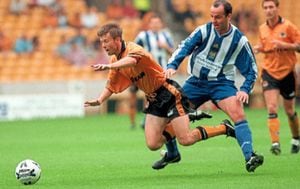
“I can’t wait to get back to work, I love working, and I know the feelings of those winning dressing rooms and what great places they are.
“Or the coach journey home after you have had a good win on the road, there is nothing like it, so the sooner I can get back the better.”
Whilst waiting for an opportunity Cook is due back in Wolverhampton next month, guest of honour at one of the excellent Q&A nights at the Cleveland Arms hosted by Matt Murray.
It won’t be the first time he has been back in front of the Wolves fans.
Since leaving Molineux he was on the opposite side on several occasions with vastly contrasting results.
Cook struck the only goal of the game to secure victory on his Stockport debut against Wolves before, in the early stages of the 2002/03 season, his return with Burnley wasn’t quite so successful.
His children Liam, Megan and Kieran were Burnley mascots on the day, and there is a lovely photograph of Cook with them prior to kick off.
“I’m not sure they were even back down the tunnel and I had been sent off,” he says.
“Wolves were a strong team and we had worked all week on going to Molineux and being hard to beat but as a player I always wanted to go into a game to win, and not to contain.
“Anyway, we had worked on being solid and barely getting out of our own half and then within 90 seconds we conceded a goal.
“My head has absolutely fallen off by this point and not long after I fouled Alex Rae and at about four minutes past three Jeff Winter has sent me off.
“Great credit to Wolves, the stadium was bouncing and the fans were right behind the team but I was back down the tunnel catching up with my kids.
“I’m not too sure the manager Stan Ternent spoke to me for a while after that!”
Cook will certainly be speaking on the evening of March 10th and is promising plenty of Wolves stories in one episode of the Cook Report that will definitely be worth catching!
“It will be great to catch up with the Wolves fans again,” he says.
“I have had a lot of experiences in football, good and bad, and while I’m a Liverpool fan, and Wigan will always be a club so close to my heart, I think Wolves will probably always be my favourite from the ones I only played for.
“I captained Wolves, I loved playing for Wolves, and there was just that massive disappointment that we didn’t get promoted.
“Could I have stayed and been part of a Wolves team that got promoted? We will never know but I would have loved it, that’s for sure.”
Cook has his Liverpool season ticket, and he loves watching them play, but, at 54, there are plenty more miles in the managerial tank remaining and therefore plenty more places he would much rather be on a matchday.
“As much as I love Liverpool and getting to the games, I’d much prefer getting back into football myself and letting someone else use the season tickets,” he insists.
Paul Cook loves football, but he’d much rather be involved in it than watching it.
*Tickets priced £10 are still available for the night with Cook at the Cleveland on Thursday, March 10th. Call (01902) 451021 or visit www.clevelandarms.com/bookingoffice to book.


